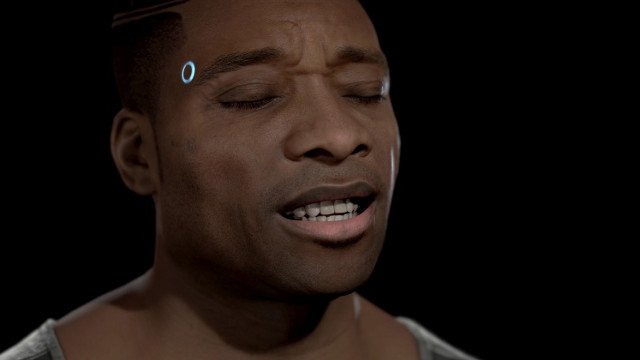Detroit Become Human is made by a developer that isn’t exactly well-known for its nuance. Quantic Dream, previously responsible for over-complicated sci-fi and awkward shower scenes in the likes of Beyond Two Souls, Heavy Rain, and Fahrenheit, didn’t seem like the ideal candidate to tackle the topic of racial discrimination. Androids substituting minorities in stories about prejudice and civil rights has been a well-worn and often misused trope in science-fiction, and Quantic Dream and its founder David Cage‘s prior history led me to believe that playing Detroit Become Human would be akin to being the conductor in a particularly gnarly trainwreck. While there are certainly glaring issues present in some of its branching paths, the divisive studio has managed to craft a compelling world in Detroit, enriched by fantastic performances and state-of-the-art motion-capturing.
Detroit Become Human places you in control of three androids in 2038 Detroit. Kara is a cleaning droid assigned to a broken and abusive home; Markus is caring for an elderly artist who is sympathetic of the dutiful androids’ inherent plight; Connor works alongside the police, who have tasked him with getting to the bottom of a recent spree of violent droid-on-human crimes. Each character can venture down a variety of different paths depending on the choices you make, and there’s no right or wrong answer in terms of which path you take.
Unlike Heavy Rain, which frequently pushed the player in the “right” direction, it rarely feels like Detroit is punishing you for making a particular choice. Sure, some unfortunate circumstances can take place if you make an unsavory decision or two, but the outcomes aren’t incongruous with the rest of the story. Previous Quantic Dream games have struggled with certain selectable choices coming out of left-field, but the majority of options laid out in front of me were in keeping with each character’s personality.
Considering Detroit‘s controversial subject matter, that Quantic Dream has invested so much effort into its various winding paths is a fundamental factor in its success. However, there are also instances in which the developer’s pursuit to create a satisfying experience from all angles can result in misguided scenes, and leaps in logic are made to ensure that die-hard pacifists are placated even if it’s to the detriment of its story.
Detroit Become Human Review: Choose-Your-Own Revolt

Detroit follows its three protagonists as they struggle to figure out their place in the world. Created by the mega-corporation CyberLife to serve humans, Kara and Markus find themselves forced into moments of tragedy that cause them to question their own identity, while the subservient Connor hunts down androids who have discovered their own agency. These androids are referred to as “deviants,” with a growing number of these rebellious droids populating Detroit.
The parallels to real-world issues are obvious. The androids are treated as slaves, with the humans viewing them as their property. Violence is routinely committed against the droids, though this is treated as little more than property damage. Their efforts to break free from their oppressors see them being (literally) shut down, and them being referred to as deviants for breaking the status quo diminishes their humanity.
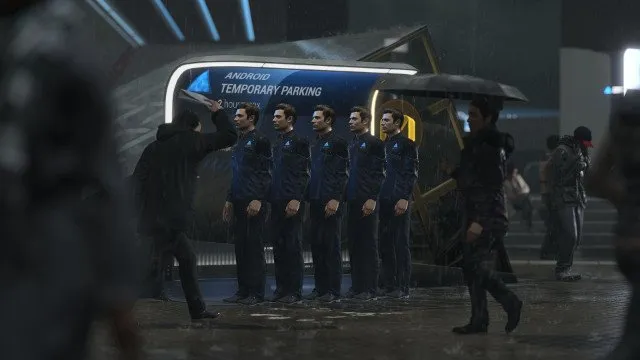
I was pleasantly surprised by how Quantic Dream handles the more controversial stances its protagonists can take against their oppressors. With the real world now being so divided that the ethics of punching actual Nazis is apparently up for debate, I had reservations that Quantic wouldn’t “go there” and show the moral ambiguity of a revolution. Fighting back against discrimination isn’t as easy as engaging in a friendly debate with bigots and hoping that they’ll change their mind, and Detroit doesn’t do any moral grandstanding in this regard. There’s no finger-wagging when you react violently against someone threatening your existence, even if your allies often won’t agree with your decisions.
Detroit Become Human Review: Pacifism, Schmasafism
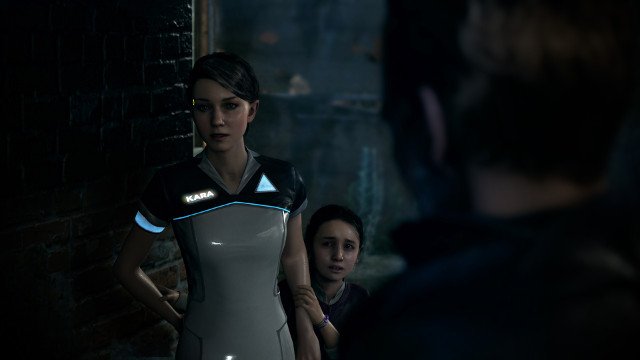
Unfortunately, Detroit doesn’t always handle its theme with this much care. Due to the nature of the game’s branching story, the version of events you can experience can differ wildly compared to another player’s — I learned as much after being pointed in the direction of embarking on a”pacifist run” by GR’s Tyler Treese, where your non-aggressive and distinctly neutral choices come to a mind-boggling conclusion. Had I experienced this particular version of Detroit during my first playthrough, my impression of the game would have been soured.
There are so many different paths to take in Detroit that we’re likely going to see a variety of polarizing opinions from those who have played it. Though I was playing the game pre-release, I found that some of the paths I had ventured down during my playthroughs had been discovered by less than 5% of all players, indicating just how varied your experience with Detroit can be. It takes an estimated 40 hours to discover each path, and certain secrets will be kept hidden from you if you don’t choose the dialogue options necessary to uncover them.
With each chapter concluding with a flowchart showing your various decisions, highlighting the percentage of players who opted for the same choices as you, it’s interesting to see how popular or unpopular your decisions were with others. You can also opt to see your friends’ decisions, before branding them cowards for playing the game like a bunch of centrists.
Detroit Become Human Review: You Can’t Spell Quantic Dream Without QTE
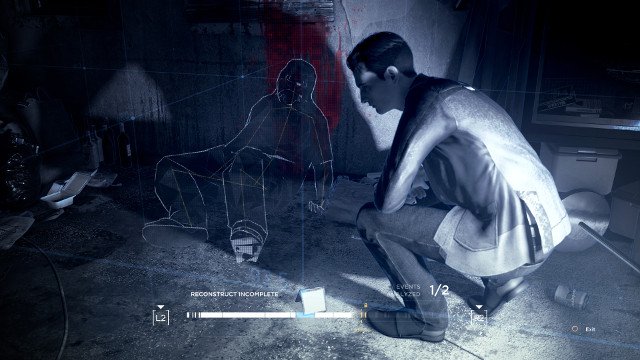
It wouldn’t be a Quantic Dream game without quick-time events, and Detroit Become Human is packed with them. If you aren’t into the whole “hold down X and R2 to drink your coffee” style of hands-off gameplay, then Detroit isn’t going to change your mind. There are a few chapters that require more player involvement, from stealth sections through to investigating crime scenes, though they each serve to provide accessible ways of remaining engaged with its story by way of performing simple actions.
While Quantic Dream does mix things up as Detroit progresses, the studio’s attempts to replicate the androids’ lack of agency means that a couple of hours are spent slowly meandering around a few chapters as you get to know the game’s cast of characters. Quantic Dream has always struggled with delivering a compelling opening act to its games, and Detroit is no different, with you slowly walking towards interactive objects before engaging in dull conversation with those around you.
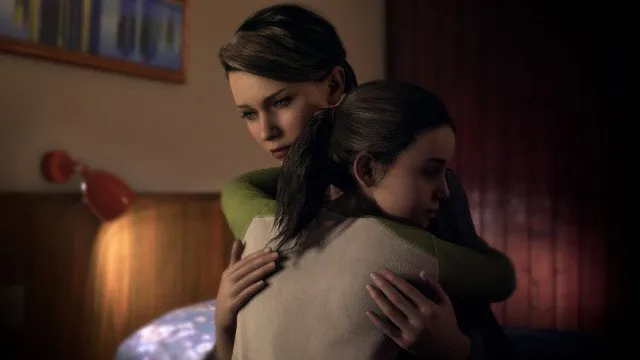
However, when Detroit ups the ante it really starts hitting its stride. Valorie Curry (Kara), Jesse Williams (Markus), and Bryan Dechart (Connor) each deliver engrossing performances, backed up by some of the best motion-capture work I’ve seen in a game. Detailing the android uprising through three unique perspectives, Curry, Williams, and Dechart each convey the transition from duty-bound android to troubled AI soul wonderfully, even if its writers could have spent a little more time establishing the events behind these transitions. Though Detroit has an explanation for androids swiftly turning into “deviants,” a lot of its characters become very human very quickly, with the robotic aspect of their personalities swiftly disappearing in the process.
Still, that’s not a slight on Detroit‘s cast or the excellent work of its animation team. The PS4 recently had God of War show off its capabilities nearly five years into its life cycle, and now Detroit: Become Human is so visually impressive that it’s easy to forget that you’re playing a video game. The subtleties of each performance are captured perfectly, and even ancillary characters such as the drunk detective Hank, fiery rebel North, and young Alice completely knock it out of the park. This is one of the most well-acted games around, and even when its story branches down less-than-stellar paths, its talented cast still keeps it interesting.
Detroit Become Human Review: The Final Verdict
Detroit Become Human is Quantic Dream’s best game yet, though if you haven’t been a fan of the studio’s previous output, this is unlikely to change your mind. The QTE-heavy gameplay remains divisive, though this time around it’s attached to a gripping story that — for the most part — avoids the problems faced by its developer’s previous work.
Unlike Beyond Two Souls and its mostly linear plot, your decisions in Detroit really mean something, and you’ll likely find that you have a completely different experience with it compared to your friends. Its branching paths contain many surprises, and though it misses the mark by a wide margin in a few of them, it hits much more often than it misses. For those like me who have enjoyed Quantic Dream’s games as a guilty pleasure, this is the studio’s first release where the story meets its ambition. For PS4 owners, this is yet another excellent exclusive game to make its way to the console.
-
Superb performances across the board.
-
40 hours of branching paths.
-
Your choices drastically change the rest of the game.
-
No finger-wagging against violent choices.
-
One of the best-looking games on PS4.
-
Abundance of quick-time events.
-
Some story paths are highly questionable.
-
A very slow start.
